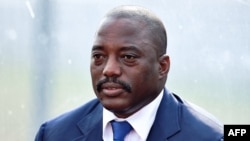Opponents of Congolese President Joseph Kabila went on strike on Tuesday to demand that he steps down when his mandate expires in December.
In the commercial center of the capital Kinshasa, home to 12 million people, rush hour seemed lighter than usual. In the city's surrounding districts, especially opposition strongholds such as Limete, many shops were shuttered.
Police fired tear gas to disperse dozens of protesters from opposition leader Etienne Tshisekedi's UDPS party, who threw stones and erected barricades near the party headquarters in the Kinshasa district of Limete, a Reuters witness said.
The strike appeared to have significantly less uptake than one in February over the same issue. In the eastern city of Goma and southern mining hub of Lubumbashi, where foreign firms have big investments, residents said that activity largely carried on as usual.
"I really regret seeing our Congolese brothers and sisters open their stores," said Samuel Kazadi, a motorbike taxi driver on Kinshasa's Avenue de Commerce, where several shops had their metal doors locked.
But he added: "We are waiting for Dec. 19 ... Kabila won't stay in power. The population will be in the street every day."
Elections were due to be held in November, before Kabila's mandate runs out on Dec. 19, but will be delayed as authorities enroll millions of new voters.
Kabila's opponents accuse him of dragging his feet on holding the election in order to cling to power in Democratic Republic of Congo, a country that has not seen a peaceful change of government since independence from Belgium in 1960.
Western powers are leaning on him to honor the constitution, which limits a president to two terms, and step down. They fear political tensions could reignite a regional war in the country's mineral-rich east that killed millions of people between 1996 and 2003.
A government spokesman on Radio France International, whose FM station was off air locally, as it often is on opposition protest days, dismissed the strike as the work of "some radicals ... having some old fashioned fun."
African Union-appointed facilitator, Togolese diplomat Edem Kodjo, opened talks on Tuesday on the timetable for the vote.
The main opposition alliance, led by Etienne Tshisekedi, is boycotting the talks, which it sees as a delaying tactic. The talks, expected to last until Saturday, are only meant to set a schedule for further talks whose aim will eventually be to set an election timetable.
In an olive branch to the opposition, the government agreed to free several democracy activists on Friday to try to ease tensions, but Tshisekedi called it insufficient.
Some opposition leaders did show up for the opening session, including Tshisekedi's former chief of staff Albert Moleka and president of the CDER party, Jean-Lucien Bussa.
"Our doors remain wide open. Today or tomorrow, they can join us at any time," Kodjo said in his opening remarks.
Kabila took power when his father was assassinated in 2001, then won his first election in 2006.





